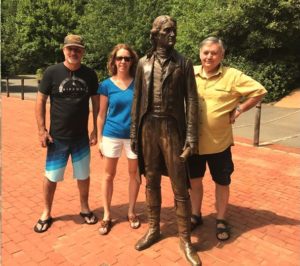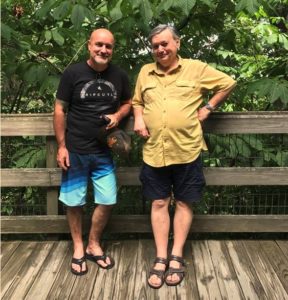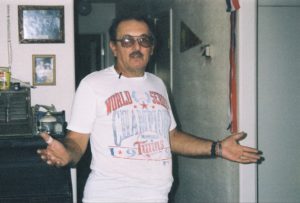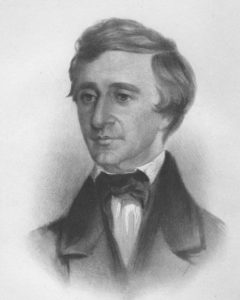Begin at about minute 14.
Rudolf Steiner on the abolition of the spirit in the West
Certainly true about communism. Mao tse-tung told the young Dalai Lama, “Religion is poison.” But Marxists are not the only ones denying spirit. In effect, so does much of organized religion and virtually all of the commercial and cultural establishment. You can see how wonderfully well we are doing without it.
Mr. Jefferson and friends
A morning walk this morning at nearby Monticello with Simon and Michelle, at the end of their current visit to Charlottesville.
Simon Hay, Michelle Buss, Mr. Jefferson, and unknown distinguished stranger

Simon and me on the walking trail

Memory loss and memory access
This sounds just like what the guys told Rita and me 15+ years ago, that we never lose memories, we lose access to them. Only, TGU said the memories are stored in the non-physical (which is why they are invulnerable to physical injury). Physical injury can prevent us from accessing them, but when we go over to the other side — the non-3D, they’re still there as they were all along. Little by little, science catches up, sometimes.
https://futurism.com/new-evidence-suggests-alzheimers-doesnt-destroy-memories-it-only-blocks-them/
John DeMarco 1940-2007
My elder brother John, the last time I saw him, in 2002. Not a great photo, but the best of the few I have. He and I lived very different lives, never nearby. His last years were spent in Nevada, while I of course was in Virginia. An upright man of great competence and rigid principles, gone a long time already.

Steiner quote on communicating with the dead
Happy Birthday, Henry!

Henry Thoreau was born 200 years ago today, July 12, 1817, in Concord, Massachusetts. A great American, a great citizen of the 3D and non-3D world alike.
Living almost entirely in New England, never venturing farther north than Montreal, never farther south than Philadelphia, never farther west than Minnesota (and that in his final few months, trying to recover from the tuberculosis that killed him), he instead, as he put it, “traveled extensively in Concord,” and affected the entire world, though it took many a long decade before his influence spread so far.
He set down his thought in words that have transformed the life of many a reader, and will transform the life of many persons yet to come. A gift America gave the world; a gift to the America that shaped him, and the America he would never see. He was only 44 when he died on May 6, 1862.
For context, he was born when James Monroe was president, only five years after the War of 1812. He died under the presidency of Abraham Lincoln, months before the Emancipation Proclamation. (Thus he lived his entire life under the shadow of slavery, with no indication that it would ever be eliminated, though in fact in three years more, it would be gone.) He probably never heard of Ulysses S. Grant, and he certainly never heard Antietam Creek, nor Gettysburg, nor Appomattox Court House. It would be another five years after his death before the transcontinental railroad would be completed, or Alaska purchased. He lived before radio, before telephones, before electric lights,, yet in many ways he’s still ahead of us.
Happy Birthday, Henry, and may your work live on!